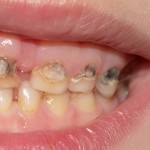
The commonest reason for planned admission of children under the age of 11 to hospital in England and Scotland is for dental extractions and studies suggest that 40% of those having primary teeth extracted have first permanent molar teeth extracted. High sugar intake, irregular toothbrushing with fluoride toothpaste, and symptomatic dental attendance behaviours are associated with caries and may be difficult to address. However, in other areas eg. Smoking motivational interviewing (MI) approaches have been successful.
The aim of this multi-centre randomised controlled trial was to test the efficacy of a dental nurse–delivered intervention, in reducing the recurrence of dental caries in children who had a primary tooth extracted 2 years previously.
Methods
Children aged 5 to 7 y who were scheduled to have at least 1 primary tooth extracted for dental caries under general anaesthesia, inhalation sedation, or local anaesthesia were eligible for recruitment. Children participating in other studies or having all 4 first permanent molars extracted were excluded. Children were randomised to a ‘talking’ intervention (DR-BNI) developed by a clinical and health psychologist and informed by motivational interviewing (MI) techniques.
The intervention was structure in 6 segments (Build Rapport, Ask about Pros and Cons, Feedback, Readiness to Change, Action Plan, Dental Appointment and Thanks) focusing on keeping newly erupting teeth healthy. The aim of the DR-BNI was to increase parental self-efficacy for 3 child oral health–related behaviours: twice-daily toothbrushing with fluoride toothpaste; controlling free sugars intake, especially at bedtime; and attending a dentist regularly for preventive care rather than symptomatically. Dental nurses received specific training in the DR-BNI and MI techniques and were advised to agree on 1 or 2 goals with parents. The nurses practiced in their clinics following training. Agreed goals were tailored for each family and the nurse helped the parent make a follow up appointment at 3-4 months an sent a text reminder. The placebo intervention was also developed by a clinical and health psychologist but used an educational delivery mode structured around concepts of growing up, shedding teeth, and growing new ones, with illustrations. Both groups were given the same take home leaflet on dental development.
The primary outcome was dental caries experience 2 years post-intervention on any teeth in either dentition. The outcome was assessed by a single examiner blind to group assignment. The teeth were examined for untreated caries into dentine, restorations, and fissure sealants.
Results
- Patients were recruited at 10 centres in England, 1 in Scotland and 1 in Northern Ireland.
- 119 children were randomised to the DR-BNI group and 122 to the placebo control with 235 (98%) receiving the interventions.
- Baseline characteristics of the 2 groups were similar with a median of 5 teeth extracted mainly under general anaesthesia.
- 193 (80%) of participating children were examined at 2 years with 191 being analysed, 88 (74%) in the DR-BNI group and 103 (84%) in the control group.
- Only 44% of children in the DR-BNI group developed new caries compared with 62% in the control group a significant reduction (P = 0.021).
- The odds of new caries experience occurring were reduced by 51% in the DR-BNI group as compared with control.
- There was a 29% decrease in the relative risk of new caries experience in the DR-BNI group as compared with control.
Conclusions
The authors concluded: –
In a wide range of children at high caries risk, this single low- cost, low-intensity intervention was successful in significantly reducing the risk of new caries experience.
This trial has implications for changing paediatric dental practice internationally. Training in, and implementation of, an MI-informed brief intervention provides opportunities for dental nurses to go beyond clinical prevention to facilitate behaviour change and to support oral health improvements for children at high caries risk.
Comments
This interesting trial used a specifically developed psychosocial intervention delivered by dental nurses to a group of children at high caries risk. Most of the interventions were delivered at a routine appointment with some being delivered at a specific appointment up to 6 weeks post operatively. Dropouts were slightly higher in the intervention group than the control. A separate analysis was undertaken to see if the differences arose from a single centre 9 of the 12 centres had sufficient numbers of the analysis with 8 out of the 9 centres demonstrating changes in the same direction. The other centre had results in the opposite direction. Families from this Centre were mainly of Bangladeshi heritage, so adaptation of the intervention related to cultural norms need to be considered.
The results of this trial are very encouraging, and it would be interesting to see if this approach can be repeated in other areas. It would also be interesting to see if this type of approach would be successful in high risk populations before caries has progressed to requiring dental extraction.
Links
Primary Paper
Pine CM, Adair PM, Burnside G, Brennan L, Sutton L, Edwards RT, Ezeofor V, Albadri S, Curnow MM, Deery C, Hosey MT, Willis-Lake J, Lynn J, Parry J, Wong FSL. Dental RECUR Randomized Trial to Prevent Caries Recurrence in Children. J Dent Res. 2020 Jan 16:22034519886808. doi:10.1177/0022034519886808. [Epub ahead of print] PubMed PMID: 31944893.
Other references
Dental Elf – 17th Aug 2017
Dental Elf – 5th May 2014
The use of motivational interviewing to improve oral health has potential but needs more research
